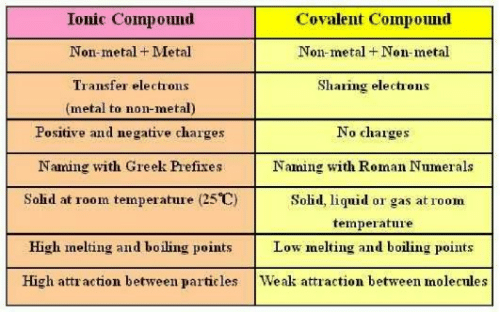Class 10 Exam > Class 10 Questions > Give 5 differences between ionic compounds an...
Start Learning for Free
Give 5 differences between ionic compounds and covalent compounds?
Most Upvoted Answer
Give 5 differences between ionic compounds and covalent compounds?

Community Answer
Give 5 differences between ionic compounds and covalent compounds?
Differences between Ionic and Covalent Compounds
- Nature of Bonding: Ionic compounds are formed by the transfer of electrons from one atom to another, resulting in the formation of ions. Covalent compounds are formed by the sharing of electrons between atoms.
- Type of Elements: Ionic compounds are usually formed between a metal and a non-metal. Covalent compounds are usually formed between non-metals.
- Physical Properties: Ionic compounds have high melting and boiling points, are usually solid at room temperature, and have a crystalline structure. Covalent compounds have low melting and boiling points, can exist as solids, liquids, or gases at room temperature, and have a molecular structure.
- Solubility: Ionic compounds are usually soluble in water and other polar solvents, but not in non-polar solvents. Covalent compounds are usually insoluble in water and polar solvents, but soluble in non-polar solvents.
- Conductivity: Ionic compounds are good conductors of electricity when dissolved in water or melted because they have free ions that can carry an electric charge. Covalent compounds are usually poor conductors of electricity because they do not have free ions.
Ionic and covalent compounds differ in their nature of bonding, type of elements, physical properties, solubility, and conductivity. Ionic compounds are formed by the transfer of electrons from one atom to another, resulting in the formation of ions, while covalent compounds are formed by the sharing of electrons between atoms. Ionic compounds are usually formed between a metal and a non-metal, while covalent compounds are usually formed between non-metals.
Ionic compounds have high melting and boiling points, are usually solid at room temperature, and have a crystalline structure. Covalent compounds have low melting and boiling points, can exist as solids, liquids, or gases at room temperature, and have a molecular structure.
Ionic compounds are usually soluble in water and other polar solvents, but not in non-polar solvents. Covalent compounds are usually insoluble in water and polar solvents, but soluble in non-polar solvents.
Ionic compounds are good conductors of electricity when dissolved in water or melted because they have free ions that can carry an electric charge. Covalent compounds are usually poor conductors of electricity because they do not have free ions.
Attention Class 10 Students!
To make sure you are not studying endlessly, EduRev has designed Class 10 study material, with Structured Courses, Videos, & Test Series. Plus get personalized analysis, doubt solving and improvement plans to achieve a great score in Class 10.

|
Explore Courses for Class 10 exam
|

|
Similar Class 10 Doubts
Give 5 differences between ionic compounds and covalent compounds?
Question Description
Give 5 differences between ionic compounds and covalent compounds? for Class 10 2024 is part of Class 10 preparation. The Question and answers have been prepared according to the Class 10 exam syllabus. Information about Give 5 differences between ionic compounds and covalent compounds? covers all topics & solutions for Class 10 2024 Exam. Find important definitions, questions, meanings, examples, exercises and tests below for Give 5 differences between ionic compounds and covalent compounds?.
Give 5 differences between ionic compounds and covalent compounds? for Class 10 2024 is part of Class 10 preparation. The Question and answers have been prepared according to the Class 10 exam syllabus. Information about Give 5 differences between ionic compounds and covalent compounds? covers all topics & solutions for Class 10 2024 Exam. Find important definitions, questions, meanings, examples, exercises and tests below for Give 5 differences between ionic compounds and covalent compounds?.
Solutions for Give 5 differences between ionic compounds and covalent compounds? in English & in Hindi are available as part of our courses for Class 10.
Download more important topics, notes, lectures and mock test series for Class 10 Exam by signing up for free.
Here you can find the meaning of Give 5 differences between ionic compounds and covalent compounds? defined & explained in the simplest way possible. Besides giving the explanation of
Give 5 differences between ionic compounds and covalent compounds?, a detailed solution for Give 5 differences between ionic compounds and covalent compounds? has been provided alongside types of Give 5 differences between ionic compounds and covalent compounds? theory, EduRev gives you an
ample number of questions to practice Give 5 differences between ionic compounds and covalent compounds? tests, examples and also practice Class 10 tests.

|
Explore Courses for Class 10 exam
|

|
Suggested Free Tests
Signup for Free!
Signup to see your scores go up within 7 days! Learn & Practice with 1000+ FREE Notes, Videos & Tests.

























